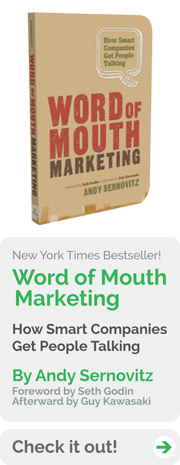10:15 — Bergen Anderson introduces GasPedal‘s CEO, Andy Sernovitz.
10:16 — “This is our serious lesson. This is the important stuff.” We always have an ethics talk because WOM is all about trust. You can’t start open honest communications by lying to people.
10:17 — Ethics is the foundation you build a WOM program on. Anybody can do great advertising, but if you want that extra boost that WOM can give you, people have to trust you. Trust is the fundamental effort leading to success.
10:18 — Disclosure is the difference between honest and sleazy. Disclosure is really easy to do well. The complexity of a complete ethics program can be done easily. It’s nothing new. There are very clear laws from FTC on how you are ethical on WOM and social media. It’s not a blogger debate. Not a gray area—it’s mandatory.
10:19 — It’s always been illegal to give false statements—social media is not a way to get around the law with false testimonials. You cannot replace “reporter” with “blogger.”
10:20 — The FTC says that WOM programs require truthfulness and disclosure. Don’t lie about who the bloggers are and what they belive. So yeah, you can hire bloggers, but they must disclose that they are doing it for hire. If they work for you and they say inaccurate things, you must monitor it and control it. There is no “don’t ask don’t tell” for social media outreach.
10:22 — You have to create policies and training programs. If you have a social media policy in place, and you train your team, if someone does something wrong, it’s not your fault.
10:23 — It’s simple. Don’t give cash for coverage in social media! When you do, it’s advertising, and not social media. This is where you will get in trouble.
10:24 — As to real disclosure, bloggers can’t put a vague statement on their About page. They have to disclose that the post is paid for in some way. The FTC doesn’t dictate the language in which it is stated, but it must be in a way that people understand.
10:25 — Don’t lie to your mom! If your mom can’t figure it out then don’t do it. It must be clear and conspicuous to the average reader. If readers have to figure out if the post is sponsored, it’s not clear and concise.
10:27 — These are the ten magic words, “I work for ___, and this is my opinon.”
10:28 — There are some deeper ideas behind disclosure. Who are you? Were you paid? How? Freebie? Cash? Is it an honest opinon based on a real experience? Don’t write a review on what you haven’t experienced. You cannot, by law, pay people to say something’s good if they never have experienced it. No false endorsements—even in social media.
10:30 — These rules have been around from FTC for many years.
10:31 — When companies get in trouble it is a training failure. Companies don’t set out to do “stealth marketing” but they do get in trouble when a junior executive hires an agency that’s sleazy. When a company doesn’t know what’s happening or what to look for, they get into trouble.
10:32 — Often, no one sits the junior executive down and tells him/her how to use social media ethically. It’s not how they did it in college. Training is what it’s all about.
10:33 — Create a disclosure policy. If there are rogue employees, who do things anyway, the FTC says you’re not responsible.
10:34 — Here’s a disclosure best practices toolkit from the Social Media Business Council. It is a series of checklists to build you own social media policy. If you follow this, your company will comply. Go through the checklists and see how your company complies.
10:35 — There are six areas: disclosure of identity; personal/unofficial blogging and outreach (if blogging about work, mention it); blogger relations; compensation and incentives’ agencies and contractor disclosure; creative flexibility (nobody wants to take the creative out of social media. Characters are ok—just as long as we know there’s a marketing objective.) Use this checklist to build a policy for yourselves.
10:37 — You, the brand, are responsible for what your agencies do. You have to be careful who you hire and make sure that they know your policies. If your agencies haven’t come to you on disclosure rules first, you should be worried. If you heard about them, then there might be a reason to worry.
10:38 — We have a chance to do something good! New technology, we’re all experimenting, but can’t totally define how it works. Spam got started because there were no rules. We can save social media from email’s fate by raising our standards. Companies need to hold the line—say no fudging, no b.s., and say something is wrong when it’s wrong.
10:39 — Save your brand, save your reputation, and save your job by being ethical and complying with what the FTC has laid out. Social media is too important to give up to sleazy marketing and advertising!
10:40 — If you have to ask, the answer is no. It is easier to be honest. Pass it on.
Q & A
Q: Delana from Coleman, “Do you have any examples of companies that got caught?”
A: Belkin. Customers found out some kid was paying people 65 cents for fake reviews. The CEO had to do an old school press release to say that they don’t do that. Some over ambitious kid decided to do it. If you “sometimes” pay for reviews, but it’s not disclosed, you will be tainted.
Q: Diane Thomspon from Reuters, “Certification is getting buzz. How many companies are working in that direction? Where does policy suffice and certification begin?”
A: Companies are adding policies to their HR. Amazing how much can be covered by adding “social media” to rules that are already in place. Those who screw up already have power to screw up in email. Eventually it will be part of basic training, but now must be worked into HR and employee orientation.
Q: Andy from Texas Instruments, “Have a strong ethics compliance program when adding social media.”
A: Once companies get past the “oh my god!” of social media, it becomes obvious that social media is not different from other media disclosure ethics.
Love this live coverage? It’s all thanks to the amazing Tish Grier.


